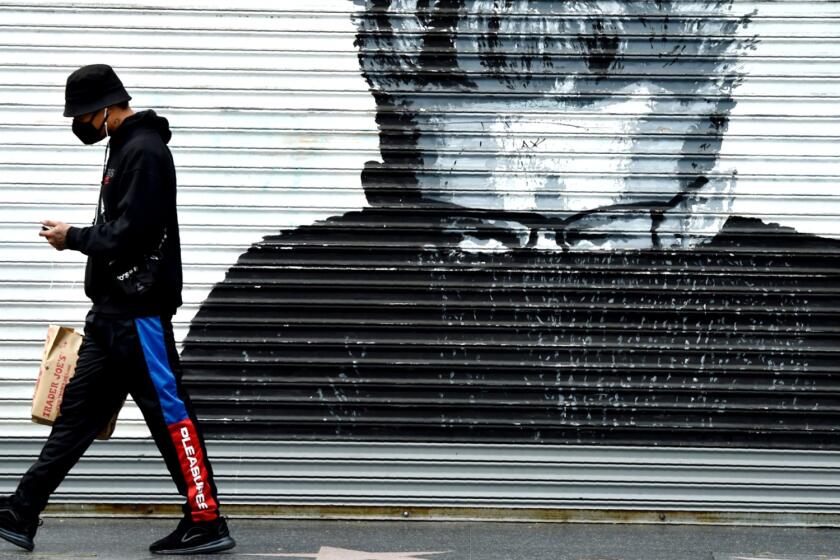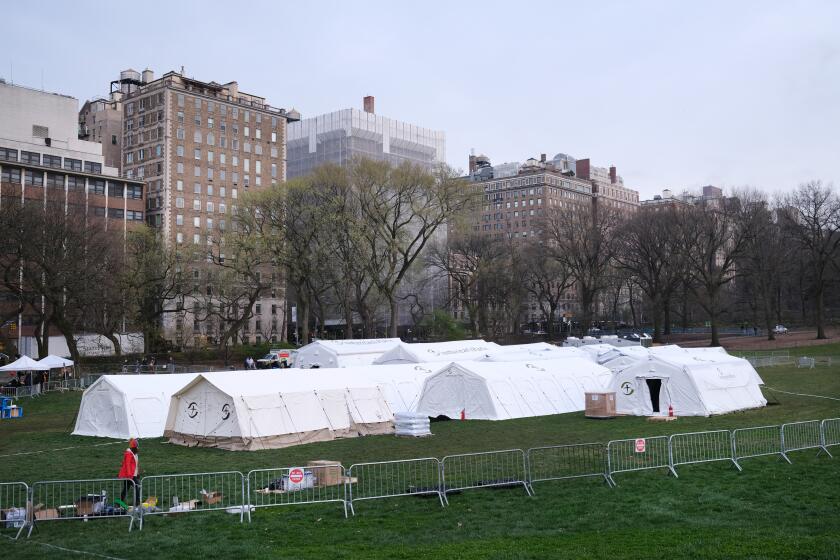Column: Flesh-eating apocalyptic films and shows didn’t prepare us for this pandemic’s horror
- Share via
We should have been much better prepared for the COVID-19 pandemic.
I’m not talking about on a federal or local level — although President Trump’s firing of the pandemic experts and ignoring the medical community during early weeks, not to mention California’s decision to stop funding a bunch of mobile hospitals — certainly contributed to the crisis.
No, I’m talking about each and every one of us, bathed as we have been in decades’ worth of apocalyptic tales, many of them centered on illness and/or governmental ineptitude. In fact, there’s one on Apple TV right now, “See,” in which the world’s population has been all but wiped out by a pandemic that has left nearly every survivor, including Jason Momoa, blind.
Blind. Get it?
Whether by recognizable virus (“Outbreak,” “Contagion,” “Containment, “Black Death”), radiation (“Chernobyl,” “On the Beach”), weaponized rage (“28 Days Later”), biological warfare (“Daybreak”) or the ever popular zombie-disease (“The Walking Dead,” “Zombieland,” “World War Z,” “Shaun of the Dead”), mass infection is one of film and television’s favorite topics.
The latest updates from our reporters in California and around the world
So while the threat of disaster, from earthquakes to the Rapture, has filled many a basement or bunker with canned goods — and many of us now are conditioned to scan the landscape for the best zombie-proof locales — we are just now realizing how utterly unhelpful, and perhaps even harmful, all of those apocalyptic “what if” stories are.
Seriously, how many people here greeted early suggestions of American containment with raised eyebrow and a snappy retort along the lines of, “Well, it’s not like people are turning into zombies.” OK, great, I’m the only one. Me and the president, of course.
While one assumes that Trump had more information and experts at hand than I did, we have both clearly spent far too much time watching fictional film and television. According to which deadly viruses cause immediate and gorily graphic symptoms, often accompanied by bloody eyes, limb-twitching and growls. Fictional viruses spread across the world in a matter of days, turning domiciles into cairns and highways into parking lots, lined with cars filled with corpses that may or may not eat your face off.
Newscasters fall ill and die horrible deaths on air, nations are left leaderless as heads of state and representative bodies collapse in a single day, grocery stores and malls become resources that must be looted for survival, often at great peril.
And it all happens so fast that only the completely oblivious — see please the “I’m going to the shop” scene from “Shaun of the Dead” — could fail to understand the import of what is happening.
Such oblivion is often expressed via coma — in “28 Days Later” and “The Walking Dead,” the main character emerges from weeks in a hospital bed to find the world completely changed.
Coronavirus has devastated New York City. Los Angeles wants to know if it’s in for the same.
None of which excuses the scenes of spring breakers on the Florida beaches or families clogging SoCal trails before all those beaches and trails were officially closed. (Honestly, there is nothing like a closed beach to make people wake up and smell the anti-bacterial gel.) But it does, perhaps, explain them.
To be sure, there have been plenty of scenes chilling enough for any pandemic film. Cruise ships filled with sick and well passengers seeking port like the Flying Dutchman; families saying farewell to the dying through hospital windows; governors begging for more ventilators and getting broken ones or none at all; medical staff intubating patient after patient before going home to strip and sleep in basements and garages to avoid infecting their families.
But most Americans are not members of the medical profession or of emergency response teams. Mercifully, and may this remain true forever and ever amen, most of us have not experienced a COVID-19 infection firsthand. At least not yet. The numbers are boggling, the maps on which the infection blooms globally are horrifying, the firsthand accounts being shared on all media platforms are terrifying but the streets, though silent and eerie, are not filled with zombies or people felled on the spot. Potential life-altering ramifications are just now sinking in.
The world’s population will not be cut by 60% in 28 days or however long Rick Grimes was in that coma, but a large yet unknown number of people are going to die in the coming weeks, even with our better-late-than-never attempts at containment. These attempts have shut down the global economy and as the experts in the U.S. push “peak infections” into May, possibly June, it is eminently clear that we have no idea how long this is going to last.
All those fast-moving, survival-skill-celebrating “what if” world-ending films and series we loved to deconstruct as metaphorically insightful or even prescient now seem, at best, superfluous. Which may explain why, despite all those “best films about pandemic” lists that were blithely posted in early days, viewers are turning instead to comedy.
Real horror, as any horror fan knows, is uncertainty. We are currently both the characters in the story, most of us going about our now-restricted daily life with little understanding of what lurks at the edges, and the viewers, watching as deaths mount, supplies run out and leaders struggle to contain what so far cannot be killed.
Turns out the most relevant metaphor for apocalypse isn’t a zombie staggering around, or a rage monster rising from the dark or an identifiable cloud of death creeping across the planet. It’s the quiet vacuum filled by Zoom meetings and far too much time on social media as we wait to see how bad things are going to get — watching through sleepless hours as the degrees of separation between our families and COVID-19 count down.
As our days of confinement pass, the dramatic choices of near-instantaneous epidemic, or undead monsters, and certainly the narrative use of comas, begin to make perfect sense. Pandemic movies are, at heart, action flicks — things need to move fast. But for those of us fortunate enough to remain, thus far, at least several degrees removed from infection, life has instead slowed down to an increasingly interior balancing act of worry, vigilance, uncertainty and yes, boredom.
Is it possible to use the pandemic as a way of experiencing the fruits of boredom? Why and how a theater critic is telling himself to do nothing.
Never before, let me add, has boredom seemed such a blessing, and none of us would trade it for the world. But we are animals unused to confinement. For those battling depression, anxiety disorder, addiction and other mental health challenges, confinement is something far more dangerous than fractiousness.
For the rest of us, being thankful for each day we are allowed to complain about nothing more than the irritating realities of staying at home does not, alas, prevent the irritation. We can donate blood and money, offer support from six feet away, clap and make signs lauding healthcare workers — but even our desires to get out there and help are thwarted by the nature of the crisis. The way we can help the most is by staying where we are and waiting.
In many ways, it’s the postapocalyptic stories — with their crisis-created tribes, rules regarding movement and resource sharing, and over-riding cautions about triggering an attack or resurgence of whatever evil interrupted life as we knew it — that capture the imperatives of this moment. But even those have a heightened level of drama that is unhelpful. We are not surrounded by monsters who can hear our every breath or alone in a landscape stripped bare by disease or Martians.
We are as we were, sheltering at home, working, praying, walking the dogs and hoping that, in the next few weeks or months or years, we and those we know and love will remain well, the hospitals will stand, the numbers begin to fall and the red blooms of the maps recede.
Then we can emerge to rebuild, reacquaint and tell stories that celebrate the drama of endurance — stories in which, with any luck, the “what if” is not outside our control after all.
More to Read
The biggest entertainment stories
Get our big stories about Hollywood, film, television, music, arts, culture and more right in your inbox as soon as they publish.
You may occasionally receive promotional content from the Los Angeles Times.














